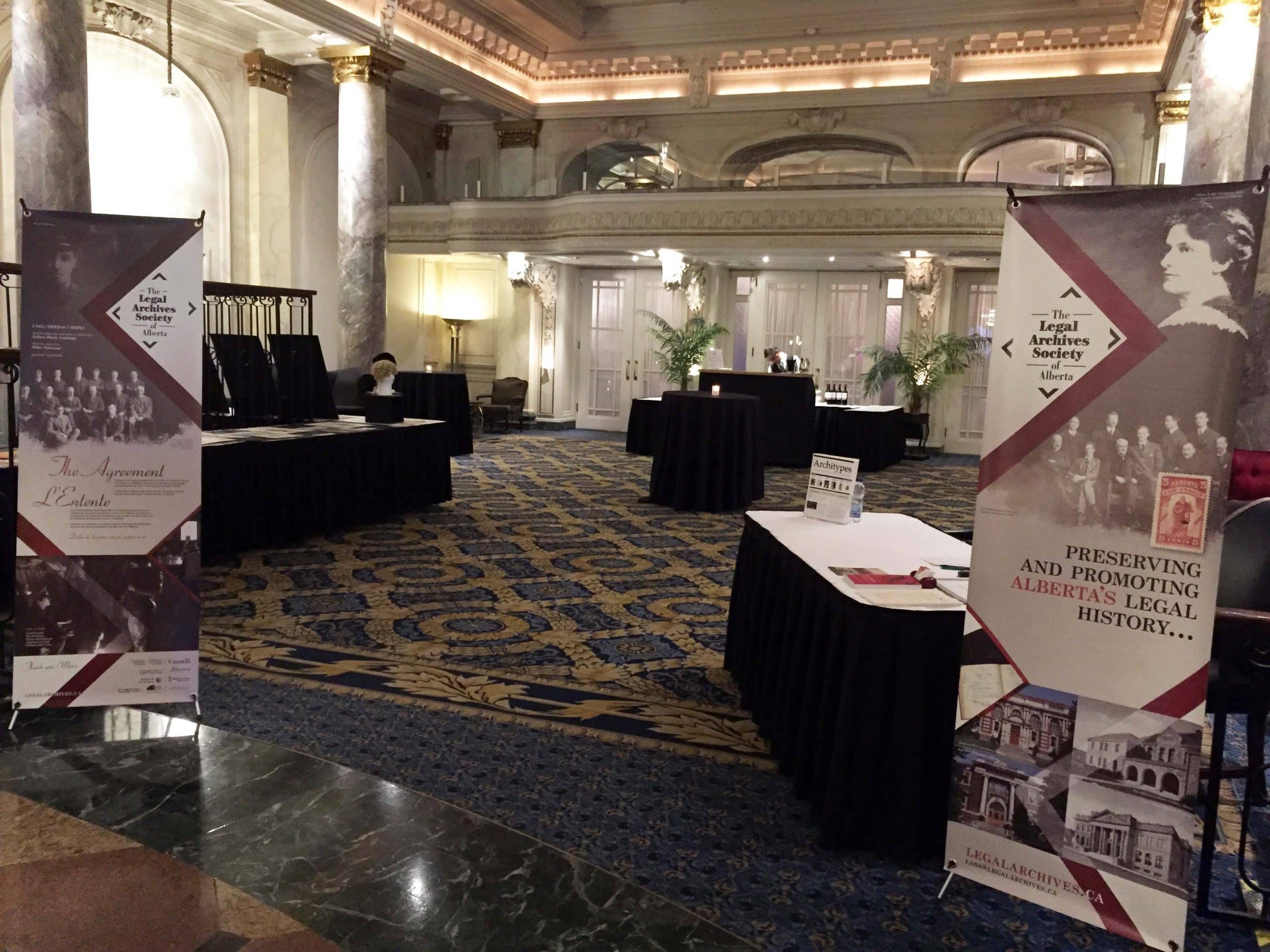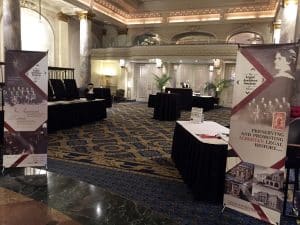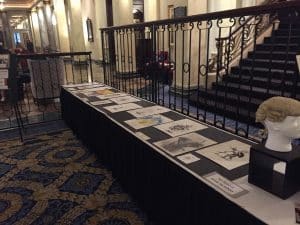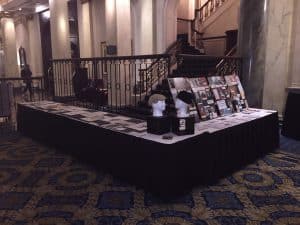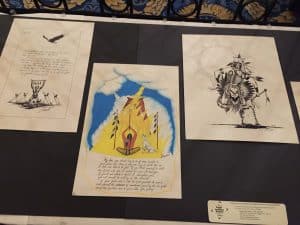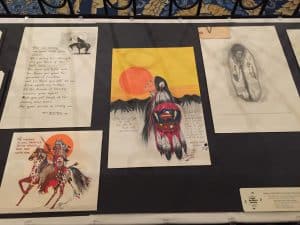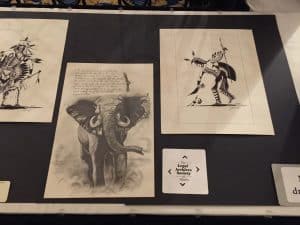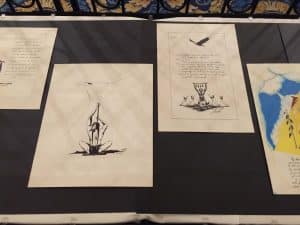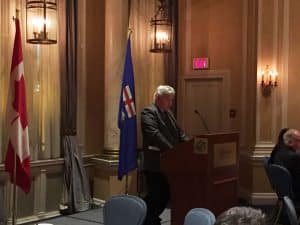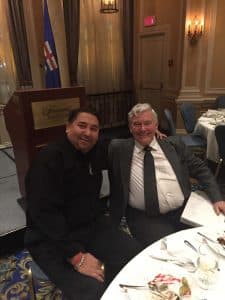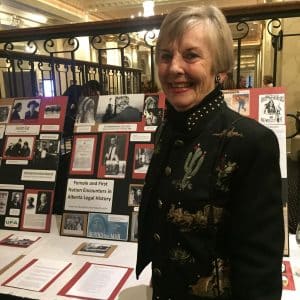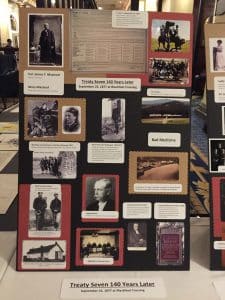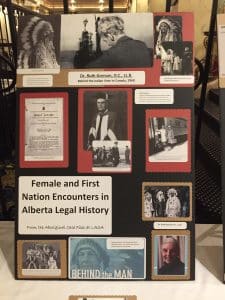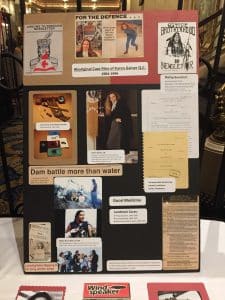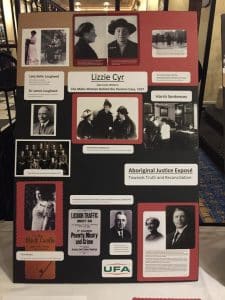LASA hosted its Annual Historical Fundraising Dinner in Calgary on October 19, 2017 at the Fairmont Palliser Hotel. We were delighted to welcome the Honourable John Reilly, retired Judge of the Provincial Court of Alberta, who spoke about his days working in the aboriginal communities, dealing with aboriginals and observing how the Canadian justice system, from his viewpoint, failed aboriginal people.
Appointed at the age of thirty, Mr. Reilly sat on the bench for thirty-three years and was the primary judge for the Stoney Indian Reserve as well as the towns of Cochrane and Canmore. It was during this time, he said, “my frontal lobe became fully developed and I was able to understand things differently.” It was his fundamental change in understanding of aboriginal circumstances, and the law, that formed the focus of his presentation.
He began his speech by referencing Section 27 of the Truth and Reconciliation Commission’s Final Report. It called for the Federation of Law Societies of Canada to “ensure that lawyers receive appropriate cultural competency training.” Judge Reilly supported this initiative as he noted that it was not until he was nearly fifty, and on the Bench for twenty years, that he became familiar with issues of aboriginal awareness and justice.
This personal transformation, he recalled, came in the years between 1993 and 1995 when Canmore and Cochrane were added to his circuit. He commented, he “became more aware of the huge over-representation of aboriginal offenders in the criminal justice system. It was only then that I realized that Indigenous people had serious problems with my wonderful justice system.” He set out to educate himself about the people from the reserve. Judge Reilly read the report prepared in 1991 by Justice R.A. Cawsey on the criminal justice system and its impact on the Indian and Metis people of Alberta. He reviewed extensive, and alarming, statistical evidence that the criminal justice system was failing Aboriginal people. This review prompted him to dive even more into the seven volumes from the Royal Commission on Aboriginal Peoples published in 1996, which detailed the history of colonial relations between the government of Canada and the Indigenous population.
Judge Reilly described that the information he learned was the theme for the balance of address. He noted the “extreme social dysfunction” in Aboriginal communities and how it affected the criminal legal system. More importantly, he realized that he was contributing to the problem by way of “punishing people for being the natural products of dysfunctional social conditions when nothing was being done about those conditions.” Judge Reilly stated that the greatest lesson he learned through this educational journey was “[t]reating people who are not the same as if they are the same is discrimination.”
His conclusion was that the best way to improve the issues of poverty and dysfunction for Indigenous people is to change the way we think. Accordingly, Judge Reilly strove to acquire a greater understanding of aboriginal history and culture. He grew to believe that Canadians must stop seeing Aboriginals as a burden and begin to see how their culture and history has contributed to the betterment of Canadian society.
Judge Reilly then addressed the Canadian criminal justice system and discussed three recent cases that exhibit a fundamental problem that aboriginal peoples have with the criminal justice system. The cases were – R. v. Wagner, R. v. Blanchard and R. v. Barton. In Judge Reilly’s opinion, each of these cases demonstrate not just a callous disregard for aboriginal victims, but also shows a lack of understanding for aboriginal culture by those who presided over these cases.
He stated, “What if we dealt with wrongdoing as ignorance in need of teaching, and illness in need of healing?” Judge Reilly discussed the notion of deterrence as a legal fiction that has no basis in empirical evidence. He concluded “I have come to the unshakable opinion that deterrence is a legal fiction.” He indicated that he was not suggesting that imprisonment should never be used and he acknowledged that in some cases an offender is so dangerous that imprisonment is required. But, he suggests, imprisonment should not be viewed as punishment but rather a way to protect the public from a dangerous offender.
During his time as a Provincial Court Judge, Reilly estimated that ninety-nine percent of violent offences he dealt with were alcohol related. In his experience, many people who drink to excess are self-medicating a depression. Judge Reilly is of the view that prison is a very depressing place and that an offender’s depression is often intensified while incarcerated thereby making him all the more likely to reoffend. Judge Reilly suggested that society would witness a decrease of the overall offender rate if we took even a fraction of the funding spent on prisons and deterrence and put it toward treating the underlying roots that cause someone to commit an offence.
Judge Reilly concluded that this form of restorative justice has been proven to reduce crime and is something we must learn from Indigenous justice. He is of the view that not every legal offence requires a route through the criminal justice system. He suggested an alternative, social justice system that would consider reasonable solutions to what are inherently social problems over a primary focus on mere punishment.
Legal Archives Society of Alberta thanked all those who attended this wonderful and informative evening in Calgary and who continue to support LASA. LASA also thanked the Honourable John Reilly, whose knowledge and passion for issues of aboriginal justice made the Calgary dinner a great success.
